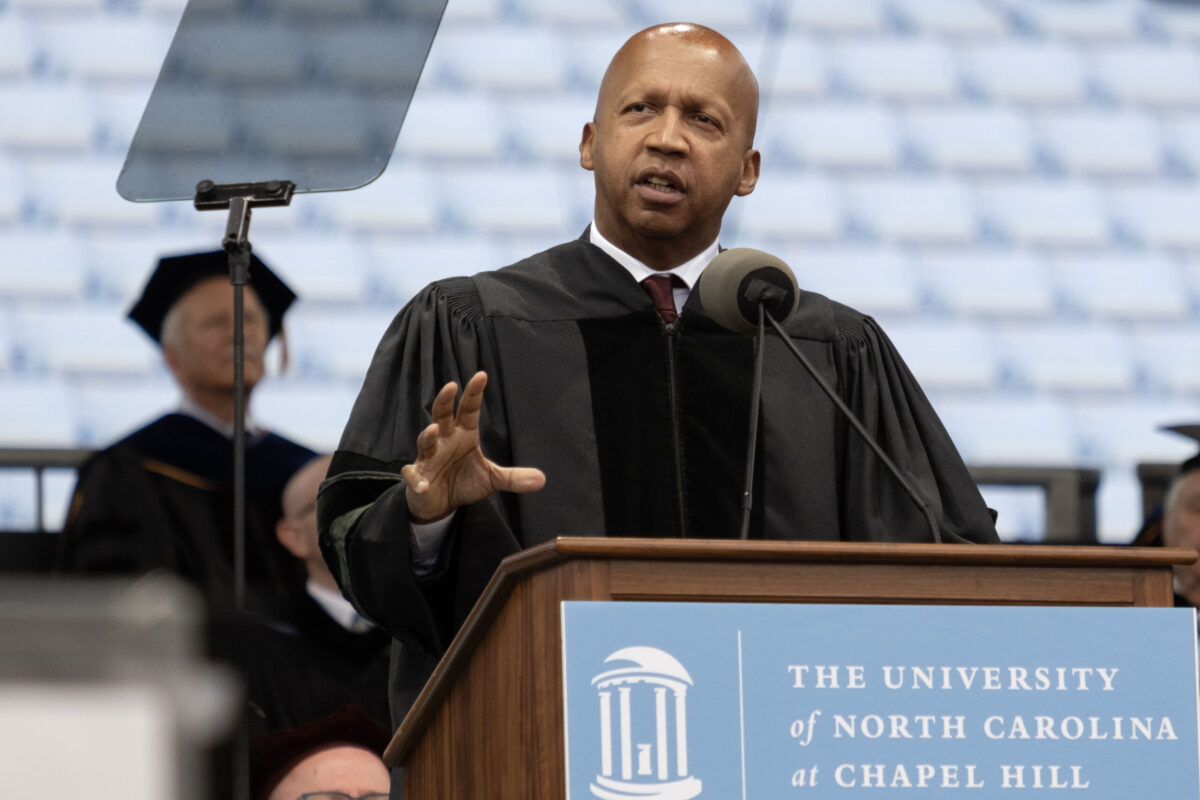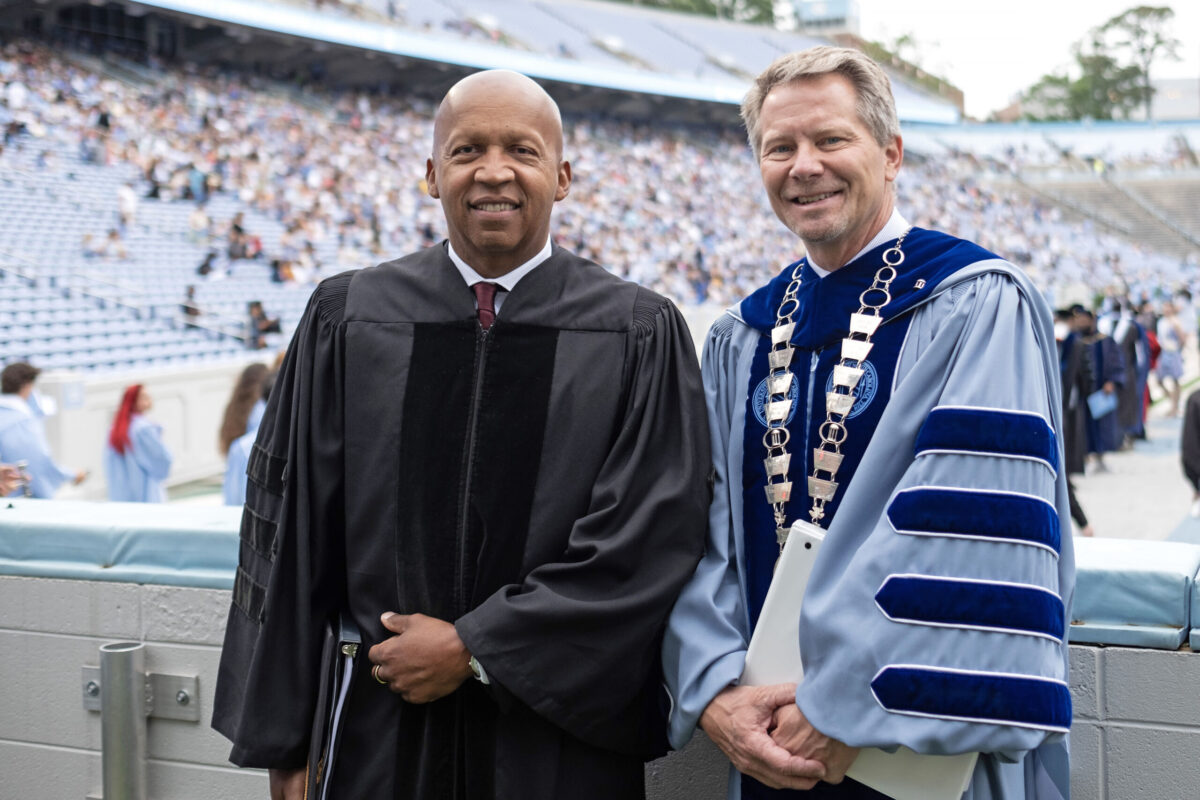Stevenson: Go Where People Suffer, Struggle, Are Marginalized
Posted on June 1, 2023
Renowned public interest lawyer and executive director of the Equal Justice Initiative, Bryan Stevenson, delivers the commencement speech on May 14 during Spring Commencement.
(Photo: UNC/Jon Gardiner ’98)
In a speech that drew frequent and heavy applause, renowned social justice advocate and attorney Bryan Stevenson told about 6,500 UNC graduates during the May 14 Spring Commencement that they have the capacity to make a difference if they’re willing to get uncomfortable.
“It’s very easy in our country to isolate ourselves from people who suffer,” Stevenson said. “It’s easy to create spaces where we don’t see the problems of other people, but I’m going to urge you to not do that because when we get proximate to the poor and the excluded and the neglected, we hear things we need to hear to create a better society.”
Stevenson is executive director of the Equal Justice Initiative, a human rights organization that has helped exonerate innocent death-row inmates, confronted abuse of the incarcerated and mentally ill, aided children prosecuted as adults and won legal challenges over excessive and unfair sentencing.
When he announced Stevenson as UNC’s commencement speaker in December, Chancellor Kevin Guskiewicz said Stevenson aligns with the University’s mission to improve society and was uniquely suited to address Carolina’s graduates. Guskiewicz presided over the ceremony that celebrated roughly 3,930 undergraduates, 1,690 master’s degree students and 307 doctoral students. Among this year’s class, more than 5,000 are North Carolina residents, 761 are first-generation students and 510 are Carolina Covenant Scholars.
“Today you will become the proud owner of a degree from the first and best public university, the University of North Carolina at Chapel Hill,” Guskiewicz said to loud applause. “There have been thousands of Tar Heels who sat right where you’re sitting, feeling the same sense of celebration and anticipation that you are.
They studied late, finished their exams and turned in their papers and came into a graduation day like this one with memories of rushing Franklin Street, climbing the Bell Tower and having life-changing conversations with friends and mind-blowing classes with our world-class faculty.”
Stevenson commended the graduates for their achievement and told them and tens of thousands attending the ceremony that too many U.S. policymakers create policies from distant places and urged the students to be different.
“I want you to commit to those who are struggling and suffering, and I want you [not] to shield yourselves with this degree and only do the things that work for you, because I believe we’re called to be better than that,” he said.
Stevenson said his grandmother, who he described as tough, strong, kind and loving, embraced him tightly so he always felt her presence. While in her 90s and near death, he said she squeezed his hand as he left her hospital room, and she asked whether he still felt her hugging him.
“I’m saying this to you because I … want you to be the kind of Carolina graduates that go into places where people have fallen down, go into places where people are suffering, go into places where people are struggling, go into places where people have been marginalized and excluded … and wrap your arms around them, affirming their humanity,” Stevenson said.
Affirming everyone’s humanity and dignity, and eliminating the politics of fear and anger are key to a better world, Stevenson said, adding when people are governed by fear and anger they tolerate and accept things they shouldn’t.
Stevenson is author of The New York Times bestselling book Just Mercy, about his efforts to exonerate a Black man wrongfully accused of murdering a teenage white girl in Monroeville, Alabama. It won the 2015 Andrew Carnegie Medal for Excellence in Nonfiction, and in 2019 it was adapted into a movie by the same name.
In 2018, Stevenson and the Equal Justice Initiative opened The Legacy Museum: From Enslavement to Mass Incarceration in Montgomery, Alabama. The museum “provides a comprehensive history of the United States with a focus on the legacy of slavery,” according to its website. Stevenson also founded the National Memorial for Peace and Justice, also in Montgomery, which publicizes through sculpture past lynchings and racial terrorism in the South, while advocating for social justice.

Bryan Stevenson poses with UNC Chancellor Kevin Guskiewicz prior to the start of the ceremony.
(Photo: UNC/Jon Gardiner ’98)
In his address to the graduates, Guskiewicz spoke about Evan Padgett ’23 of Lowell, who majored in biology with minors in chemistry and neuroscience and was described by his closest friends as the most relentless and devoted person they’d ever met. In October of 2020, Padgett was diagnosed with a rare and aggressive form of lymphoma.
“He fought through chemotherapy, a stem cell transplant and the hardships of the COVID pandemic and stayed on track academically despite all of those obstacles,” Guskiewicz said. “It was so important to Evan that he earn a Carolina degree, knowing time to be scarce. He wanted to be a graduate of this place, to reach the accomplishment he shares with all of you as members of the class of 2023.”
Padgett died in January, a day after Guskiewicz hand-delivered his degree to his home, where he was surrounded by family and friends. “I know that so many of you sitting before us have also made sacrifices and overcome hardships to be here today,” Guskiewicz said. “The reason Evan wanted that diploma so badly is it made him forever a part of this community. … I know what this degree and this accomplishment meant to him, and I challenge each of you to think deeply about what your Carolina degree will mean to you.”
UNC awarded Stevenson an honorary doctors of letters degree. Others receiving honorary degrees were:
- Alexander Julian II ’69, a renowned designer who was inducted into the Fashion Hall of Fame at age 33, introduced the iconic argyle on UNC’s men’s basketball uniforms and in 1980 created the Alexander Julian Award for artistic excellence at UNC.
- Douglas Carmichael McIntyre II ’78 (’81 JD), a former congressman who has earned national awards for advocating for veterans, senior citizens, rural health care, law enforcement, youth sports and federal recognition for the Lumbee Tribe.
- Jonathan T.M. Reckford ’84, CEO of Habitat for Humanity International and a recipient of a Henry Luce Scholarship, which aims to increase awareness of Asia among future leaders in American society.
- Hilda L. Solis, Los Angeles County supervisor for the first district, credited with accelerating the county’s efforts to combat homelessness and with expanding health care access in areas of need. In 2009, she became the first Latina to serve as secretary of the U.S. Labor Department.
- Lucille H. Webb, a former educator, and president and founding member of Strengthening the Black Family Inc., a Raleigh-based nonprofit, which has been cited by the Centers for Disease Control and Prevention for supporting programs addressing chronic health issues in communities of color.
— Laurie D. Willis ’86
